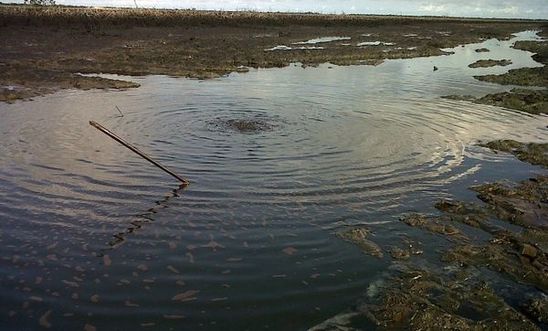
Press releases
Nigeria: Alarming number of oil spills blight Niger Delta

- More than 550 oil spills in Niger Delta in 2014 alone
- Shell reports 204 oil spills
- ENI oil company reports 349 spills
“Shell is cheating people out of just compensation. The Bodo case makes clear just what it takes to get this company to own up to the truth about oil spills – six years and UK court proceedings” – Audrey Gaughran
Royal Dutch Shell and the Italian multinational oil company ENI have admitted to more than 550 oil spills in the Niger Delta last year, according to an Amnesty International analysis of the companies’ latest figures. By contrast, on average, there were only 10 spills a year across the whole of Europe between 1971 and 2011.
Shell reported 204 Niger Delta spills in 2014 while ENI, which operates in a smaller area, reported a staggering 349 spills.
Amnesty International’s Global Issues Director Audrey Gaughran said:
“These figures are seriously alarming. ENI has clearly lost control over its operations in the Niger Delta. And despite all its promises, Shell has made no progress on tackling oil spills. In any other country, this would be a national emergency. In Nigeria it appears to be standard operating procedure for the oil industry. The human cost is horrific – people living with pollution every day of their lives.”
The companies say that these spills resulted in only 30,000 barrels - or 5 million litres – of oil spilt. However, given the very poor reporting systems used by oil companies this figure is highly likely to be a significant underestimate.
Royal Dutch Shell
The oil companies blame sabotage and theft for the vast majority of the spills. This claim is hotly contested by communities and NGOs and has been shown to be wrong.
In November 2014, during a legal action in the UK, Shell was forced to admit that it had underestimated the size of the two major Niger Delta oil spills, after years of denials.
The volume of oil spilt matters because the amount of compensation paid to affected communities is linked to the amount of oil that is estimated to have been spilt. Shell finally agreed to pay £55 million to the Bodo community in the Niger Delta after originally offering to give them a paltry £4,000.
Audrey Gaughran added:
“When a company has to pay £55 million for two oil spills it originally tried to pass off as minor, it should raise serious questions for investors about the hidden liabilities Shell may be carrying in the Niger Delta.
“If all oil spills could be scrutinised the way the two Bodo spills were then the true scale of the damage and Shell’s financial liabilities would be revealed. But this is not only about liabilities – there is a very serious human issue. Shell is cheating people out of just compensation. The Bodo case makes clear just what it takes to get this company to own up to the truth about oil spills – six years and UK court proceedings. What about all the hundreds of other communities this company has potentially cheated?”
Documents released as part of the UK legal action revealed that the company knew for years that one of its main pipelines was old and hazardous, but had failed to maintain it properly.
Additionally, a UK court ruling found that Shell has a responsibility to ensure the integrity of its pipelines.
ENI
Italian oil giant ENI, which owns the Nigerian Agip Oil Company is a smaller player in the Niger Delta than Shell and has received less attention. But the number of oil spills from its operations requires urgent action by both the Nigerian and Italian governments.
On top of the 349 spills in 2014, ENI reported 500 oil spills in 2013. The Nigerian regulator reported 474 oil spills from ENI operations in 2012.
Audrey Gaughran said:
“The Italian government must investigate what is happening in ENI’s Nigerian operations. These figures raise serious questions about potential negligence by the company going back many years.“As a matter of priority all oil firms in Nigeria must urgently disclose the age and condition of their infrastructure, carry out reviews of their operating practices, and make the findings public so that communities know what is going on.Whatever the cause, according to Nigerian law, the oil companies are responsible for containing and cleaning up spills, and returning affected areas to their prior state. However, this rarely happens. As a result people in the Niger Delta are living with the cumulative impact of decades of pollution."